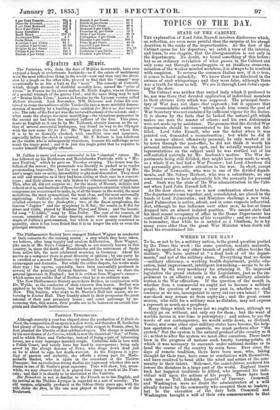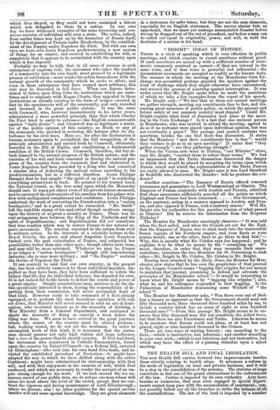WHERE IS THE MAN?
To be, or not to be, a military nation, is the grand question posited by the Times this week : the same question, mutatis mutandis, might be applied to any other branch of public affairs besides the military. have arrived at "a dead lock of the depart- ments," and not of the military alone. Everything that we desire —military efficiency, a working health department, public edu- cation, local improvement, intelligent lawmaking—seems to be ob- structed by the very machinery for attaining it. To improved legislation the grand obstacle is the Legislature just as the im- pediment to an effective army or an efficient Military adminis- tration is the War officialism. If the question of the month is, whether from a commercial we ought not to become a military people, the question of many a year past is, whether we shall continue as we are, incompetent to carryout our own intent ? The war-shock may arouse us from asphyxia ; and the great censor morum, who calls for a military man as dictator, may not express a reproach so much as a prophecy. Many things which we have not we ought to have, although we weakly go on without, and only cry for them ; but the want of warlike means in war-time is peremptory ; and unless, to use the words of our contemporary, we would settle down as Holland, Venice, and some other once military states have become, the help- less spectators of others' quarrels, we must perforce alter "the system.. But the system is the natural product of the country as it is ; so that to alter the system we must alter ourselves. There have been in the progress of nations such knotty turning-points, at which it was necessary to succumb under national decline or to bend the course of the country by main force. Ever since the days of remote tradition, there have been men, who, taking thought for their race have come to conclusions with themselves, and have resolved to Lend alike the mind and action of the com- munity to their intent. Mahomet, the camel-driver, rendered his lowers the dictators to a large part of the world. England traces back her happiest traditions to Alfred, who impressed his indi- vidual will upon the actions of his people. There have beets such men as Tell, Rudolph, Leopold of Tuscany. Cromwell and Washington were no doubt the administrators of a will already formed by the community who accepted them as leaders; but to the execution of the duty both Cromwell and Washington brought a will of their own commensurate to that
which they obeyed, or they could not have sustained a labour which was delegated to them by a nation. In our own day we have witnessed examples of the same foreseeing and con- scious exercise of individual will over a state. The series, indeed, from earlier times was kept up by the formation of Russia itself,
by the development of Prussia under Hardenberg, by the establish- ment of the Empire under Napoleon the First. But with our own eyes we have seen Louis Napoleon predetermining a new system of things for an empire, and succeed in establishing his will, so completely that it appears to be assimilated with the country upon which it was imposed.
Probably we may be told, that in all cases of success in such enterprises of supreme rule, the statesman who takes the conduct of a community into his own hands must proceed by a legitimate process of cultivation—must render his action harmonious with the natural growth of the community which he seeks to affect; and even in those enterprises that have seemed most arbitrary, this rule may be discerned in full force. When our Barons deter- mined to fasten upon Sing John the institutions which are some- times said to originate with Magna Charta, they appealed to those institutions as already existing in the form of usages—created in fact by the spontaneous will of the community, and only recorded and crowned in the great public statute. It was the same with Cromwell, who, however inconsistently in his latter years, administered a more powerful principle than that which Charles the First tried to carry to extremes—the Rnglish commonwealth against "right divine' : and Cromwell was as legitimate a minis- ter of the public opinion of this country, as Monk or any of the statesmen who assisted in restoring the balance after its dis- turbance by the civil wars. More so ; for after the Restoration it became necessary again to reestablish the full recognition of the principle administered and carried forth by Cromwell, ultimately recorded in the Bill of Rights, and constituting a fundamental condition of the British Crown. Cromwell, therefore, did but at- tach himself to the natural progress of the British nation; and the exercise of his will and force consisted in freeing the natural pro- gress of the country from the trammels that had obstructed. it. Louis Napoleon had been preceded by a King who had conceived a similar idea of deflecting the natural course according to his predetermination, but in a different direction. Louis Philippe thought that he had caught "the spirit of an epoch" in rendering everything subservient to trade. He pointed to his trained band, the National Guard, as the true army upon which the Monarchy should rest. It was a pet object even of his private leisure moments, and he surveyed the instruments of his creation from his palace-win- dow with undisguised complacency and confidence. Louis Philippe undertook the work of converting the French nation into a "nation boutiquiere," and to a great extent he succeeded. "Mr. Smith" left the indelible stamp of his undoubted though mediocre energy upon the history of so great a country as France. There was no real antagonism here between the King of the Umbrella and the spirit of Republicanism; and Republicanism did not constitute that true reaction which was to restore France to her natural or- ganic movement. The reaction consisted in the return from civil to military action. In the intervals of a scientific lecture at the Royal Society, the grave and almost forgotten Louis Napoleon turned over the past vicissitudes of France, and estimated her possibilities better than any other man ; though others have been, and may still be, more esteemed. Whatever we may be, France is no longer a "nation boutiquiere " : though still remembering industry, she is once more military ; and "the Empire" sustains the throne of Napoleon the Third. It can scarcely be said that our own country, in the present day, has been entirely unmoved by these individual impulses. Im- perfect as they have been they have been sufficient to refute the fallacy that the day for individual influence has departed for ever. It is not indeed for feeble hands to deflect the course and power of a great empire. Simply conscientious men, anxious to do the du- ties specifically intrusted to them, fearing the responsibility of de- partin6 from their commission, will never accomplish work of that kind. However ready to take command of a fleet already equipped, or to perform the most hazardous operation with rule set down, that Minister will never succeed in such an act of domi- nation, who hesitated dissent as to the necessity of dividing a War Ministry from a Colonial Department, and continued to doubt the necessity of doing ao scarcely a week before the thing was done. We seem to have arrived at the great juncture
where the course of the country must be altered perforce; but, looking round, we do not see the workman. In order to
accomplish work of this kind, it is necessary that the states-
man should possess not only high station and large influence, but a love of the power that he should exercise. If Peel had lived,
the statesman who acquiesced in Catholic Emancipation, forced upon the country by Daniel O'Connell—in a Reform Bill, extorted by Birmingham—who took into his own hand Free-trade, and in- verted the established precedent of Protection—lie might have adopted the war to which we have drifted along with the entire Continent ; might have administered its statesmanship, with that will, and with that enjoyment in the exercise of will, which Peel confessed, and which are necessary to render the servant of an em- pire strong enough for his work. If we look around the too nu- merous crowd of our public men, we do not see one man whose will raises his head above the level of the crowd, except that we con- front the vigorous and daring countenance of Lord Ellenborough ; 'where we discern, alas ! no other qualities for the special service besides will and some special knowledge. They are great elements in a statesman for safer limes, but they are not the only elements, especially for an English statesman. The survey almost bids us apprehend, that we must yet undergo accumulated disaster before we can be dragged out of the rut of precedent, and before a man can be called out equal in originality, power, and will, to hold the destinies of a nation in his hand.



































 Previous page
Previous page